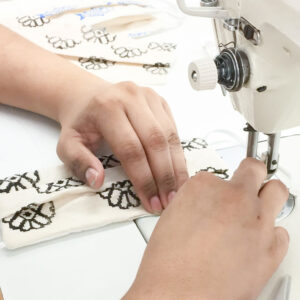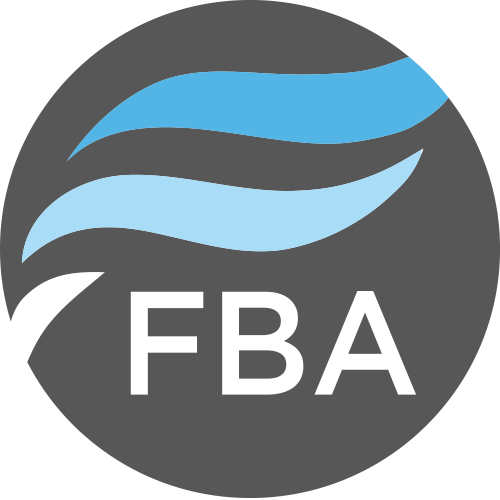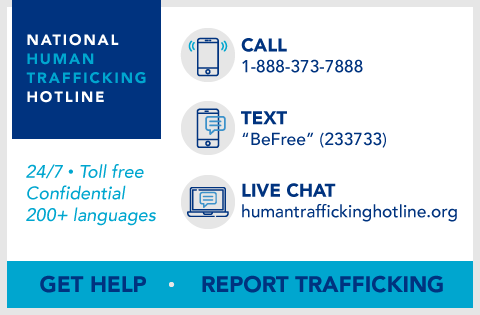Turning Fashion Upside Down
Thirteen years ago I never would have imagined that one day I would start an apparel company in India. Halfway through my junior year of college, I had just begun a semester abroad in Uganda. I thought I was there to “help” people, volunteer with orphans, explore a beautiful country, and take some courses.
I quickly learned that to really help people in a lasting way is hard and complex, and even more so when crossing cultures. I was humbled to realize that I did not have a lot to offer, but that I had a lot to learn. Thankfully, my East African classmates, professors, and homestay families were gracious and excellent teachers. Despite being challenged by the complexities, my time in Uganda ignited a life-long passion for building relationships across cultures and for working alongside and learning from women to change our world together.
Through studying and working in the area of international community development, I began to see a pattern when girls lack education and economic opportunities: it inevitably leads to an increase in forced/coerced early marriages, childhood domestic servitude, sexual exploitation, and other harmful forms of labor migration. These things occur in different forms and to varying extents all over the globe. They aren’t limited to certain regions or countries. In fact, in today’s globalized economy, injustices in one country are exploited and exacerbated by the policies and spending habits of another.
Later, while working in the area of aftercare, I saw that even after escaping from exploitative situations, the same young women continue to face barriers to employment due to lack of education, stigma, and vulnerabilities from trauma, and remain at risk to continued exploitation.
In my role as a consultant for nonprofits, it became apparent that in addition to the valiant efforts of NGOs (non-government organizations), legislatures, and law enforcement, there is a huge space for job creation and income generation that can only be filled by profitable, fair businesses. Swahlee was born out of a vision to fill this void.

Swahlee is committed to safe work and fair wages and benefits that allow employees to plan for the future. In addition to providing a safe and collaborative work environment, Swahlee partners with a non-profit organization that provides counseling and night school courses for employees to further their education and skills. We strive as a company to bring honor to the surrounding community through job creation, excellent work, transparent business practices, and leadership development. This way of business causes us to stand apart from so many operating in the garment industry where exploitation is rife.

There is no such thing as a cheap outfit: someone, somewhere is paying and it’s usually a woman.”
– Andrea Stokes
Working to right the wrongs of an industry
Injustice in the garment industry and other industries directly and indirectly contributes to human trafficking and other forms of exploitation. Only 2% of workers in the garment industry make a living wage that meets their basic needs. There is a responsibility on the part of fashion companies and consumers to do better.
The great majority of garment workers are women between the ages of 18-35. Has she received a fair wage? Does she have a safe and clean work environment? Are her hours reasonable? Does she get adequate leave time to spend with family? What happens when she has a medical emergency? Is she protected from harassment, abuse, and other human rights abuses so common in the industry? Freedom Businesses like ours are building companies throughout the fashion supply chain for the growing market of consumers starting to ask these questions.
Keeping the best of tradition
India has long been a source for some of the world’s best textiles. Continuing in this tradition, Swahlee utilizes natural, handloom fabrics that are available and unique to its location in the world. We aim to be good stewards of people and planet by sourcing from likeminded ethical suppliers and upcycling materials from surplus markets.
The fast fashion available in most retail chains today cannot compare in artistic value and longevity to textiles made using skills passed down from generation to generation. Ethical business is a way to connect these artisans to markets that acknowledge the true worth of their craft.
When makers are compensated the fair value of their work – what they are rightly owed, they can adequately provide for themselves and plan for the future. We as consumers may have means to buy less, but what we buy is fairly purchased and better made. This is the way business is supposed to function and this is a business I want to be a part of.
______
Want to learn more about Swahlee? Visit them online.
Related Articles
KAREN SCHMIDT STEPS DOWN
The Board of Directors of Freedom Business Alliance announces the upcoming departure of our Executive Director, Karen Schmidt.
A call to address modern labour exploitation
“Forced labour imposes significant economic and social burdens on society as a whole. It not only deprives individuals of their freedom and dignity but also perpetuates cycles of poverty, undermines economic development, and erodes social cohesion.”
MYTH vs REALITY: Debunking the Commonly Held Myths Around Human Trafficking
People often associate human trafficking with Jeffrey Epstein-type figures, fighting against Liam Neeson or a main character in the Sound of Freedom. And while these moments in pop culture did raise awareness for human trafficking in our modern era, they also created a lot of myths in their wake.



